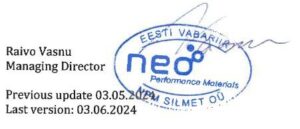Conflict Minerals Sourcing Policy

Responsible Sourcing Policy
We are aware of and actively support the international efforts to investigate, monitor and mitigate activities that contribute to illegal armed groups, human rights violations, or financial wrongdoings in tantalum supply chains as defined in Annex II of the Organization of Economic Co-operation and Development Due Diligence Guidance for Responsible Supply Chains of Minerals from Conflict-Affected and High-Risk Areas Third Edition (OECD Guidance), and listed here:
- Serious abuses associated with the extraction, transport or trade of minerals:
- Any forms of torture, cruel, inhuman and degrading treatment;
- Any forms of forced or compulsory labor;
- The worst forms of child labor;
- Other gross human rights violations and abuses such as widespread sexual violence;
- War crimes or other serious violations of international humanitarian law, crimes against humanity or genocide.
- Direct or indirect support to non-state armed groups.
- Direct or indirect support to public or private security forces.
- Bribery and fraudulent misrepresentation of the origin of minerals.
- Money laundering.
- Non-payment of taxes, fees and royalties to governments.
We respect the dignity and importance of human rights. We consider any mineral that may pose risks of contributing to the harms listed in Annex II of OECD Guidelines to be ‘conflict minerals’. We hereby commit to the due diligence steps as described in the Tin and Tantalum Supplement of the OECD Guidance. We will only purchase Tantalum containing materials from sources that have been verified as not involving or contributing to illegal armed groups, human rights violations, or financial wrongdoings as defined in Annex II of the OECD Guidance.
In support of the above, all of our relevant staff members are trained and directed to follow procedures to implement a conflict minerals due diligence system that aims to:
- Exercise due diligence with relevant suppliers consistent with the OECD Due Guidance including the Tin and Tantalum Supplement and the Responsible Business Alliance’s Responsible Minerals Assurance Process (RMAP) and encourage our suppliers to do the same.
- Provide, and expect our suppliers to cooperate in providing, due diligence information to confirm tantalum-containing material in our supply-chain does not contribute to illegal armed groups, human rights violations, or financial wrongdoings as defined in Annex II of OECD Guidance.
- Aim to establish long-term relationships with our immediate suppliers.
- Consider ways to support and build capacities of Tantalum supplying counterparties to improve performance and conform to this supply chain policy.
- Suspend or discontinue engagement with upstream suppliers after failed attempts at mitigation or immediately discontinue engagement with suppliers who pose a reasonable risk to be supporting conflict or causing severe human rights abuses.
- Undergo an annual RMAP assessment to verify our Conflict-Free status as well as identify opportunities to continually improve our conflict minerals due diligence management system.
- Commit to transparency in the implementation of this policy by making available reports on our progress to our customers, relevant stakeholders and the public (as required).
- Support the implementation of the principles and criteria of the Extractive Industry Transparency Initiative (EITI).
AAny concerns about our policy or due diligence system should be reported to Responsible Minerals Initiative through its grievance mechanism that can be accessed here.
(RMAP Standard, VIII, A.1)


